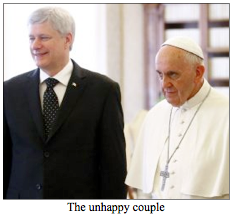It's no surprise that Pope Francis only gave PM Stephen Harper 10 minutes for his interview earlier this month. And no surprise he looked constipated in his photo op with the Prime Minister. Ten minutes with Harper would freeze the bowels of anyone concerned about global warming, and, unlike the recalcitrant Harper, the Pope is very concerned indeed.
In his encyclical released today, he called for not only an economic revolution to deal with climate change, but an ethical revolution as well, a revolution of hearts and minds to confront not only our profligacy with the Earth's resources but our inequitable use of them. His letter conflates economics, politics and ethics to proclaim against both ecological destruction and poverty.
He didn't mince words: "Doomsday predictions can no longer be met with irony or disdain. We may well be leaving to coming generations debris, desolation and filth." When he wrote, "Many of those who possess more resources and economic or political power seem mostly to be concerned with masking the problems or concealing their symptoms," he could have been referring directly to our prime minister.
He has quite correctly positioned these issues as moral issues, as indeed they obviously are. What could be greater moral issues than the greatest threats humanity faces? And even if environmental destruction did not threaten us, are we not morally responsible for what we do to other species?
Science, which has clearly laid out the dangers humanity faces, has now been reinforced with a moral imperative laid down by the leader of the most influential religious institution in the world. Will this be enough to convince the capitalist apologists? Probably not, but it does make their reactionary efforts less credible in the public eye.
I have no great respect for religious moral authority, but when it gets things as right as the Pope has gotten this, I heartily welcome it. And we must hope it is welcomed also at the critical Paris climate conference later this year.

No comments:
Post a Comment